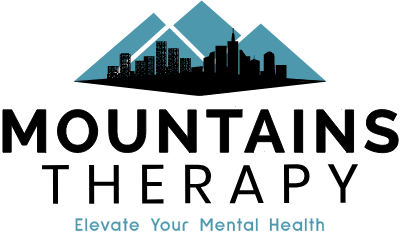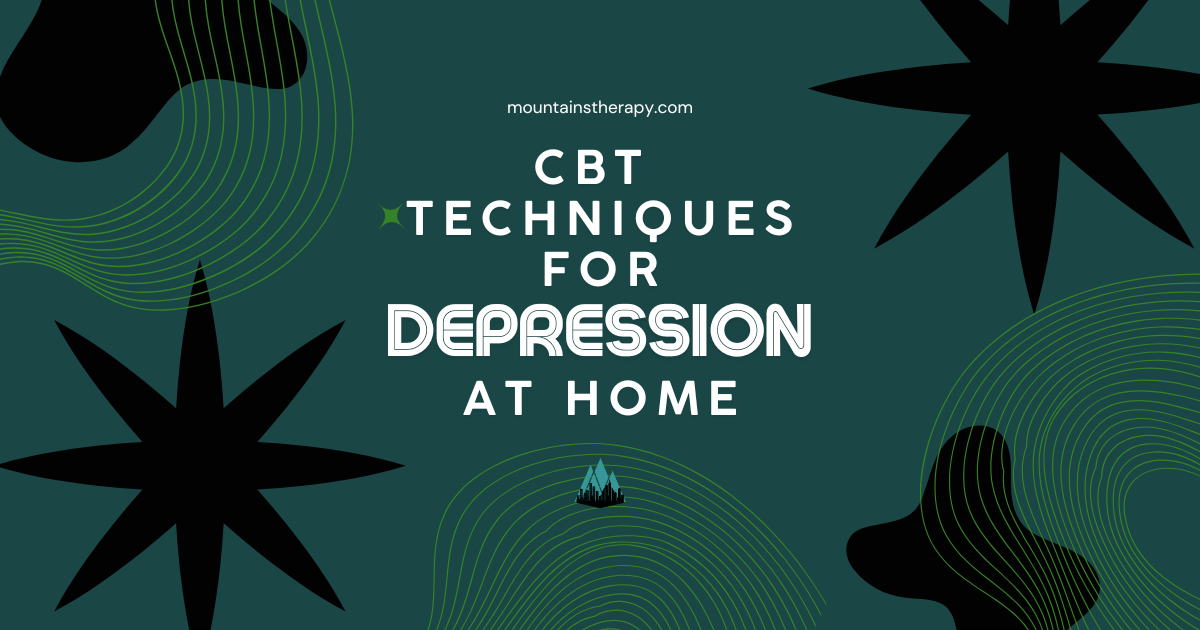CBT Therapy Techniques for Depression: Practical Tools You Can Use at Home
Learn more about CBT Therapy and Depression Therapy.
In This Blog, You’ll Learn:
- What Cognitive Behavioral Therapy (CBT) is and how it helps with depression
- Key CBT techniques for identifying and challenging negative thought patterns
- How behavioral activation and journaling improve mood and motivation
- The benefits of working with a CBT therapist for personalized guidance and support
- How Mountains Therapy can help you take the first steps toward managing depression and finding joy again
Depression can feel like an endless cycle of sadness, fatigue, and lack of motivation. At Mountains Therapy in NJ, we understand how overwhelming it can be. One highly effective treatment method is CBT therapy for depression, or Cognitive Behavioral Therapy. This approach focuses on identifying and changing negative thought patterns and behaviors that contribute to feelings of hopelessness. Let’s explore how a CBT therapist can help with cognitive therapy techniques for depression you can try at home.
Understanding CBT for Depression
CBT therapy for depression is a structured, goal-oriented approach that helps individuals recognize unhelpful thoughts and replace them with more constructive ones. A CBT mental health therapist for depression will work with you to:
- Identify negative thought patterns.
- Challenge their validity.
- Develop healthier habits and responses.
How CBT Helps with Depression
- Identifies Negative Thought Patterns: Helps recognize and challenge distorted thinking that contributes to depression.
- Develops Coping Strategies: Teaches practical skills to manage stress and improve emotional regulation.
- Focuses on Behavioral Activation: Encourages engaging in positive activities to boost mood and motivation.
- Promotes Long-Term Change: Builds healthier thought and behavior habits to prevent relapse.
This collaborative process with a depression therapist or depression counselor can help you break free from the cycle of negativity and take steps toward feeling better.
CBT Techniques for Depression and How Therapy Can Help
Working with a CBT mental health counselor for depression can provide deeper insights, personalized feedback, and accountability that make a real difference. Below are common CBT techniques and how a therapist can guide you in implementing them effectively.
1. Cognitive Restructuring
Cognitive restructuring helps you identify and challenge negative thoughts. A CBT therapist can guide you through this process by:
- Helping you recognize automatic negative thoughts that are deeply rooted and difficult to see on your own.
- Teaching you tools to challenge those thoughts with realistic alternatives.
- Creating exercises to practice reframing these thoughts between sessions.
For example, if you think, “I’m not good enough,” your CBT counselor for depression can help you question the evidence for this belief and replace it with something more constructive like, “I have strengths and accomplishments that matter.” With ongoing support, you’ll begin to shift your mindset in meaningful ways.
2. Behavioral Activation
When you’re struggling with depression, it’s common to avoid activities that once brought you joy. A CBT mental health therapist for depression can help you:
- Identify the activities you’ve been avoiding and why.
- Gradually reintroduce those activities in manageable steps.
- Monitor the impact of these activities on your mood and adjust your plan accordingly.
For example, if you enjoy walking but can’t seem to get outside, your therapist might help you set small, achievable goals like a 5-minute walk around your block. Through regular sessions, you’ll learn to reconnect with these meaningful activities and experience their positive effects.
3. Journaling and Thought Records
Journaling is a key tool in CBT counseling for depression, but it can be difficult to know where to start. A depression mental health counselor can provide guidance by:
- Showing you how to structure your thought records to track moods, triggers, and thoughts effectively.
- Helping you analyze these patterns to understand recurring themes or negative cycles.
- Offering strategies to replace harmful thoughts with healthier ones.
With consistent support from a CBT therapist, journaling becomes a tool for self-discovery, helping you better understand your emotions and thought processes.
4. Practicing Gratitude
While practicing gratitude at home is a simple way to reframe your mindset, a CBT mental health therapist for depression can deepen this practice by:
- Helping you explore the barriers that make gratitude feel challenging, such as low motivation or negative self-talk.
- Teaching you to focus on specific, meaningful experiences rather than general statements.
- Integrating gratitude exercises into your overall treatment plan to ensure consistency and long-term benefits.
For example, instead of simply writing, “I’m grateful for my family,” your therapist might encourage you to write, “I’m grateful my family supported me during a tough week.” This targeted approach can strengthen your ability to notice and appreciate positive moments.
Why Work with a Depression Counselor or CBT Therapist?
While techniques like these are helpful to practice on your own, working with a depression mental health therapist or CBT mental health counselor for depression provides crucial benefits, including:
- Expert Guidance: Therapists are trained to help you uncover the root causes of depression and identify effective tools for recovery.
- Personalized Support: Your therapist will tailor strategies to fit your unique situation and goals.
- Accountability: Regular therapy sessions provide motivation and structure, helping you stick with your progress.
- Safe Space: Therapy offers a compassionate, judgment-free environment to explore your thoughts and feelings.
At Mountains Therapy, our depression mental health counseling and CBT therapy for depression services are designed to empower you with tools that last a lifetime.
Take the First Step to Manage Depression
If you’re ready to break free from the grip of depression, you don’t have to do it alone. A skilled CBT mental health therapist for depression or depression mental health counselor can help you take meaningful steps toward healing. If you're been looking for a cognitive behavioral therapist near me, reach out to Mountains Therapy in NJ today to schedule your first depression counseling session. Together, we can help you find balance and reclaim your joy.














